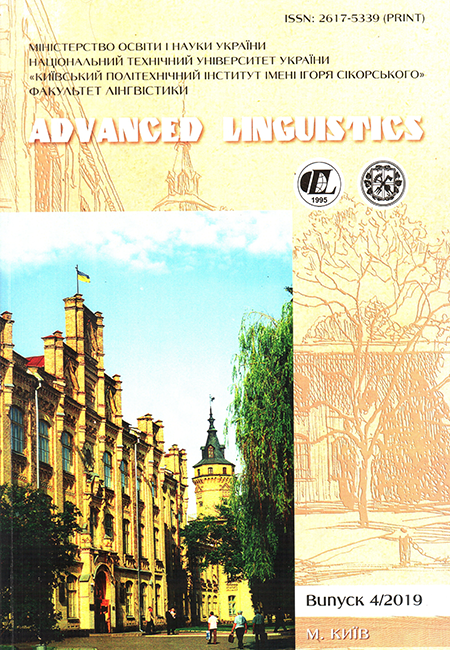CONVERSION PHENOMENON OF THE ENGLISH LANGUAGE: ITS DISTINCTIVE CHARACTERISTICS AND TRANSLATION INTO UKRAINIAN
DOI:
https://doi.org/10.20535/2617-5339.2019.4.185596Ключові слова:
conversion, word-formation, notional and functional part of speech, external form, analyticity, source word, derivative word, semantic model, equivalent, translation transformations.Анотація
This article is devoted to the investigation of such linguistic phenomenon as conversion, namely its characteristic features in the system of English parts of speech and its translation into Ukrainian. Understanding the conversion forming mechanisms can significantly expand the wordstock of the English language. For this research a lot of scientific works as well as original English texts of different genres and their Ukrainian translations were studied. It was observed that there are several approaches to understanding this phenomenon, which are more likely to complement, but not contradict each other. It was determined that conversion refers to the main highly-productive types of word-formation. The article illustrates the main characteristics of conversion that distinguish this unique phenomenon among other types of word-formation and define the main reasons why it is so widespread in the English language. The research paper also presents analysis of this unique phenomenon in the system of English notional and functional parts of speech. In addition, the peculiarities of the translating the various semantic models of conversion from English into Ukrainian are properly investigated. For a better understanding, a great number of appropriate examples are given. At the same time, special attention is paid to possible translation difficulties caused by striking differences in the English and Ukrainian languages. The investigation determines the ways of overcoming these difficulties. Moreover, the paper presents analysis of the conversion combinability with other types of word formation and interesting cases of converted phrases, sentences or their parts. The research encourages the idea of further investigation of conversion phenomenon. The results of this study can assist any translator in adequate translation from English into Ukrainian.
Посилання
Balteiro, I. (2007). Сontribution to the Study of Conversion in English. Münster.
Bauer, L., Valera, S. (2005). Conversion or Zero-derivation: An Introduction / Approaches to Conversion / Zero-derivation. Münster.
Collins dictionary. Retrieved from https://www.collinsdictionary.com/
Dubravska, D. (2010). Konversiya yak produktyvnyy sposib popovnennya slovnykovoho skladu anhliyskoyi movy. Linhvistyka ХХІ stolittya: novi doslidzhennya i perspektyvy. Kyiv. [in Ukrainian]
Harmash, O. (2005). Systema slovotvoru anhliyskoyi movy ta innovatsiyni protsesy. Zaporizhzhya. [in Ukrainian]
Ivanova, M. (2014). Konversiya kak odin iz produktivnykh sposobov obogashcheniya slovarnogo sostava v sovremennom angliyskom yazyke. [in Russian]
Karaban, V. (2002). Pereklad anhliyskoyi naukovoyi i tekhnichnoyi literatury: hramatychni trudnoshchi, leks, terminoloh. ta zhanrovo-stylist. problemy. Vinnytsya. [in Ukrainian]
Kennedy, M. (2001). Conversion in English and its implications for Functional Discourse Grammar.
Kvasylevych, D., Sasina, V. (2003). Praktykum z leksykolohiyi suchasnoyi anhliyskoyi movy. Vinnytsya. [in Ukrainian]
Velykyy akademichnyy slovnyk. Retrieved from https://dic.academic.ru/dic.nsf/enc3p/
Verba, L. (2003). Porivnyalna leksykolohiya anhliyskoyi ta ukrayinskoyi mov. Vinnytsya. [in Ukrainian]
Zagoruyko, A. (1961). Konversiya – morfologo-sintaksicheskiy sposob slovoobrazovaniya: (na materiale sovremennogo angliyskogo yazyka). Moskva. [in Russian]
Zhluktenko, Yu. (1958). Konversiya v sovremennom angliyskom yazyke kak morfologo-sintaksicheskiy sposob slovoobrazovaniya. Kyiv. [in Russian]
Zhornokuy, U. (2014). Kurs lektsiy porivnyalnoyi leksykolohiyi anhliyskoyi ta ukrayinskoyi mov: navchalno-metodychnyy posibnyk. Kyiv. [in Ukrainian]
##submission.downloads##
Опубліковано
Номер
Розділ
Ліцензія
Наше видання використовує положення про авторські права CREATIVE COMMONS для журналів відкритого доступу.
Автори, які публікуються у цьому журналі, погоджуються з наступними умовами:
1. Автори залишають за собою право на авторство своєї роботи та передають журналу право першої публікації цієї роботи на умовах ліцензії Creative Commons Attribution License, котра дозволяє іншим особам вільно розповсюджувати опубліковану роботу з обов'язковим посиланням на авторів оригінальної роботи та першу публікацію роботи у цьому журналі.
2. Автори мають право укладати самостійні додаткові угоди щодо неексклюзивного розповсюдження роботи у тому вигляді, в якому вона була опублікована цим журналом (наприклад, розміщувати роботу в електронному сховищі установи або публікувати у складі монографії), за умови збереження посилання на першу публікацію роботи у цьому журналі.

